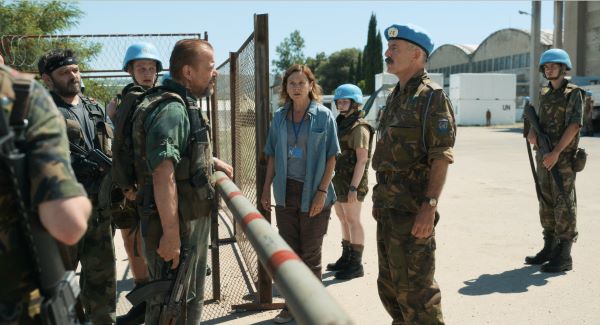

In the first scene of Quo Vadis, Aida?, Colonel Karremans (Johan Heldenbergh) of the United Nations says, “I’m just a piano player,” to the mayor of the Bosnian town of Srebrenica, where the population is largely Muslim. The year is 1995, and the Serbian Army has marched in under the orders of General Ratko Mladic (Boris Isakovic) in spite of the town’s designation as a UN safe zone. Karremans is in a bind—the UN has not granted him backup forces or authorization for airstrikes to push the Serbians back, yet it is also his duty to assure the mayor that Srebrenica will be safe. The room is dark, the atmosphere is tense. Aida (Jasna Djuricic), a resident of Srebrenica, sits next to the colonel, acting as translator. The colonel’s comment is one that needs extra explanation, as it is not an idiomatic phrase in Bosnian. Eventually, the mayor becomes so furious that he needs to be restrained as he rails against the colonel and the false promises of the UN. When the Serbians arrive, he is among the first to be taken.
The film is based on true events, and General Mladic is now a convicted war criminal. It depicts how many of Srebrenica’s residents fled to a UN base so ill-prepared that thousands were made to wait outside behind a fence, begging for help every time the gates open; of how soldiers at the base failed to muster a defense because all points of contact at the UN were on vacation; and horrifyingly, how the colonel and his men were then forced to open negotiations with Mladic, who promised to grant the people of Srebrenica safe passage to a nearby town in Bosnian territory, provided that they did not hold any kind of political office. Mladic’s manner during a meeting is one of intimidation masked in friendliness, which immediately makes the audience question whether he will keep his promise.
In short, the film dramatizes a period of tremendous fear and uncertainty in the lives of the civilians, and our unofficial guide through this chaos is Aida. As a translator working for the UN, she is granted protection, but her husband and her two sons are not. Told through her eyes, this is the story of her attempts to save them. Every step of the way, the higher-ups at the UN tell her they cannot grant her family special treatment, and for much of the film, she is able to circumvent them.
If this film succeeds, and it most certainly does, it is because of its quick pace, its strong performances, its indictment of genocide, and most significantly, its portrayal of the Bosnians in the midst of these tense circumstances. In an early scene, we see both the dead body of a woman and the meal she was in the middle of preparing as it rests in the open oven; in another, a woman washes clothes in a bucket with thousands of others outside the camp; and in an instant, a young woman makes eyes at one of Aida’s sons. Through these and many other moments long and short, there is the sense of lives independent of the horrific events that have gathered them together on screen.
Consummate in its expression and indictment of inhumanity, Quo Vadis, Aida? is tragic, horrifying, and bracing as it should be. It won’t comfort you, nor is it easy to go to sleep after watching it. But it will wake you up.
















Leave A Comment